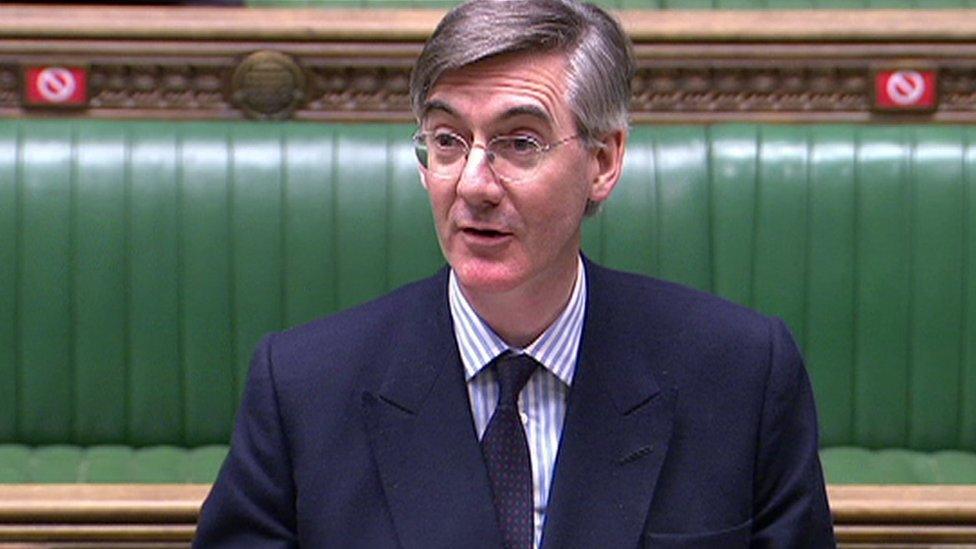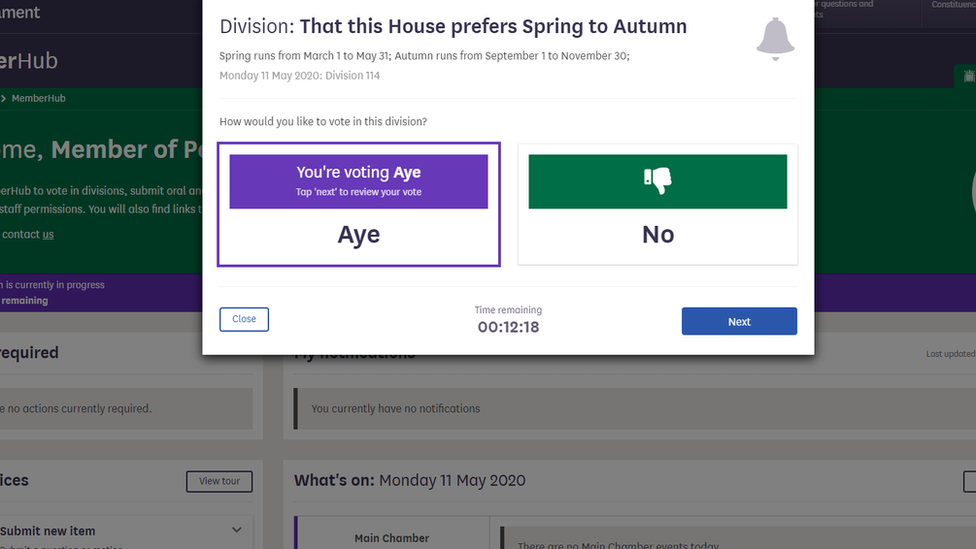Coronavirus: Rees-Mogg wants MPs back to 'set example'
- Published

MPs should return to the Commons to vote in person in the next few weeks to "set an example" to the rest of the country, Jacob-Rees Mogg has said.
The Commons leader was speaking after MPs made history by voting remotely for the first time.
But Mr Rees-Mogg said virtual voting was likely to come to an end next Wednesday, when MPs break for Whitsun.
When they return, on 2 June, he wanted to move "as quickly as possible" to "physical ways of working".
For centuries, MPs have only been able to vote by walking through the Commons division lobbies.
Social distancing rules mean there can only be about 50 MPs in the Commons chamber at a time - so many have been using video conferencing to take part in debates from home.
Now, after extensive trials to ensure the system is secure they are able to vote electronically too.

The new voting system has been thoroughly tested
At 17:45 BST on Tuesday, they made history by selecting either "aye" or "no" on their phones and computers.
The virtual vote was not on a piece of legislation, just whether or not they believed the House had considered Covid-19 following a two-day debate on the pandemic.
They approved the motion by 363 votes to 248, a majority of 115.
'Cut and thrust'
Mr Rees-Mogg extended remote voting to 20 May, by renewing a temporary standing order, but he told MPs he did not expect to do so again.
He said virtual working was not an effective way to hold the government to account - and was no substitute for the "cut and thrust" of live debate.
"It is clear that soon Parliament must set an example of how we move back gradually to a fully-functioning country again. Our constituents would expect nothing less.
"So while we must move in step with public health guidance, it is vital that when we are asking other people to work and go to their places of work if they cannot do so from home we should not be the ones who are exempt from that.
"Indeed, we should be leading by example."
After the announcement, a Labour spokesperson said ending "the successful hybrid virtual system flies in the face of the government's own public health advice and its message to work from home where possible".
"The priority must be protecting the health and well-being of all those who work in parliament," the spokesperson added.
"Ministers must publish the public health advice as a matter of urgency."
'Health assessment'
In the debate, the SNP's Tommy Shepherd, appearing via an occasionally shaky video link, called for electronic voting to be made permanent, accusing those MPs who were against it of "making a fetish of 19th Century traditions".
He said Westminster should set an example by cancelling the Whitsun recess and moving to online proceedings, like the Scottish Parliament.
But Conservative MP Sir Charles Walker, speaking in the chamber, said: "This is where Parliament should be and I am afraid that we are in danger of bringing ourselves into disrepute."
Raising health and safety concerns, Labour's Chris Elmore said: "What assessment has he (Jacob Rees-Mogg) made of members' health in order to be able to come back into the chamber?"
In response, Mr Rees-Mogg said: "The coming back will be based on advice from Public Health England, [it] will maintain social distancing."
Instead of the traditional cries of "aye" and "no" - and the Speaker's shouted instruction to "clear the lobbies" - the first electronic vote got under way with a few strokes of a laptop keyboard by the Commons clerk.
'Voting with cheese'
MPs were given 16 minutes to take part, using the secure MemberHub system. The result was announced by Speaker Sir Lindsay Hoyle during the debate that followed.
MPs took to social media to describe the experience.
Conservative Tom Tugendhat posted a video of himself walking with his children, noting: "One of the upsides is I'm walking along the path to take the kids to the swings and I've just voted. That's not bad."
The SNP's Stewart McDonald replied on Twitter: "Mine was with cheese."
The division list showed Prime Minister Boris Johnson did not take part in the electronic vote while Labour leader Sir Keir Starmer did, voting against the motion with his party colleagues.